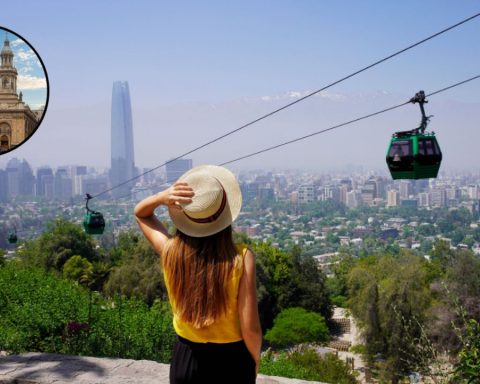In the final stretch of the campaign ahead of the Plebiscite on September 4, the right-wing political parties continue with a strategy of remaining silent, staying out of the first line of discussion, and turning a deaf ear to the call of the ruling party to present their own agreement to reform the new Constitution.
Subtracting from participating in the different debates that have filled the media in recent weeks, the representatives of the opposition parties – from Chile Vamos to the Republican Party – have given their place to figures linked to the ex-Concertación, such as senators Ximena Rincón and Matías Walker (DC), already former conventional players like Bernardo Fontaine or Constanza Hube. A phenomenon that is also visible in the interaction in social networks, according to a new report from the Social Listening Lab (Sol-UC), of the Faculty of Communications of the Catholic University.
Said study reveals that, like the last network of interactions extracted in the second half of July, the Rejection community continues without adding political figures representing the most traditional right-wing parties to the most relevant conversations. Also noteworthy is the integration of new figures to its core of influence – more linked to social movements and trade unions – such as Juan Pablo Swett, president of the National Multigremial of Entrepreneurs; and María Fernanda Ulloa, an Evópoli militant and one of the main protagonists of the Rejection campaign and television slot.
In this regard, the political scientist and director of the School of Government and Communications of the Central University, Marco Moreno, believes that “the figuration of these sectors of the center left, ex-Concertación and Amarillos por Chile, who today are occupying a greater protagonism, it is because the right has asked for it. It is not something gratuitous, it is because it is part of a tactical design, where the retreat of the figures on the right is compensated by these sectors of the center left, who assume that role ” .
Now, Moreno adds that “this is due to a design. There are no coincidences here, nor is it an improvisation, but rather a tactical and strategic design. The tactical has to do with the fact that the withdrawal in the Plebiscite campaign can allow the Rejection obtain a victory, and strategically, the bet of the right-wing sectors is in some way to install a kind of status quo, where it is sought that an eventual victory allows this path to continue with changes to the current Constitution, in any scenario eventually fades away.”
A tactic that for the political scientist Patricio Gajardo responds to the certainty that exists in the pragmatic right, which understands that the debate should not take place now, but after the Plebiscite. “The right is going to remain silent, totally. Because what they hope is that the Rejection wins, and then generate all the possible discussions, but it must be considered that there is a way, which is the 4/7 and the reduction of the quorums , and there is effective support from an important sector of the right, except for the Republican Party,” said the analyst, in the context of his participation in Political Week.
Understanding this logic, analyst Mauricio Morales points out that the only time that the Rejection receded significantly during this semester was with the permanent appearance of right-wing leaders in the media, when together with Francisco Chahuán (RN), Rojo Edwards (Republican Party) and Javier Macaya (UDI), José Antonio Kast also appeared. In this sense, Morales considers that “right-wing leaderships are profoundly harmful to Rejection, so much so that they have handed over the leadership of the campaign to center-left figures such as Rincón and Walker (DC).”
What comes after the silence?
Considering that remaining silent could be beneficial for the interests of the Rejection, the right-wing political parties assume that risk, understanding that an eventual victory could give them the key to lead the negotiations as of September 5, considering the strength of their benches in both houses of Congress. Analysts agree that the opposition parties will continue with this logic until the result of the plebiscite is known, ruling out the possibility of an eventual agreement on reforms to the new Constitution, just as the ruling party did a few days ago, following the President’s call Gabriel Boric.
In this sense, the political scientist and academic from the Autonomous University, Tomás Duval, points out that “the right tactically has already made the decision to withdraw. And understanding that decision, I believe that the leading role of the political sectors will come after the plebiscite, where obviously there is going to be a sector within the right-such as the Republican Party-that is not going to want any progress and is going to remain in its most extreme position, in which nothing is changed and everything tends to remain the same, but It is a majority sector.
In relation to a possible victory of the Rejection, Marco Moreno warns that after this withdrawal tactic, by the right-wing parties, it could cause these sectors to feel that they have greater power and a greater capacity for negotiation, and want to some maintain the status quo, and not advance in the processes of change. It is a bet, which in his opinion is risky, and which tries to force a possible restitution of the model, or return to a situation similar to the times prior to the social outbreak of 2019, which could cancel the possibility of reaching future understandings. .
“It should be considered that within the opposition to the Government, there are soft sectors and hard sectors, and I get the impression that these hard sectors – where José Antonio Kast, Francisco Chahuán, and others appear – could occupy an important position, with a hypothetical triumph of the Rejection, which would mean that these sectors, now hidden, as of September 5 could be revealed and their masks removed, mainly with the aim of stopping the processes of change and activating a kind of vetocracywhere there is a significant blockage in Congress, led by sectors that could feel empowered in that scenario,” says Moreno.
In addition, the director of the School of Government of the Central University believes that although there is agreement in the Rejection on the tactical deployment of his campaign – which has included the silence of the political parties – there are still considerable discrepancies in the strategic aspect, where in his opinion, the hardest sectors of the right are for imposing the status quo and the blockade through the vetocracy“in an effort that can lead to a complex situation in the country, from the point of view of governance.”
Finally, and regarding what could be the role of these “soft sectors” of the Rejection after a hypothetical victory in the plebiscite, Moreno believes that it is most likely that they seek to move quickly in favor of the constituent process continuing its course, ” but there they are going to find that the hardliners are going to try to stall any substantive modification, and link this result as much as possible to a political defeat of the government.”
















